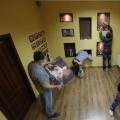Career guidance development with presentation. Presentation for the lesson on career guidance "Who to be?". “thinkers” are the most fashionable professions
IPO "OSH No. 6 of Yenakiyevo"
Career guidance lesson "WHO TO BE?"
Practical psychologist
Volodina Natalia Igorevna

Rules
- ACTIVELY PARTICIPATE IN TRAINING!
- SINCERITY
- TO ASK QUESTIONS
- ONE MICROPHONE
- COACHING "STOP"
- LISTEN AND HEAR EACH OTHER
- RESPECT EACH OTHER
- RAISED HAND

The road to happiness lies through work. There are no other paths to happiness. (Abu Shukur.)
Work frees us from three great evils: boredom, vice and want.
Voltaire

WORK And PROFESSION
- Work- expedient activity aimed at creating material and spiritual values necessary for life;
All the mental and physical costs of a person during the production of these values.
- Profession- the type of labor activity (occupation) of a person who owns a complex of special theoretical knowledge and practical skills acquired as a result of special training, work experience.


"Name your profession"
1. Who is Web Designer?
Answer : specialist in the creation of Internet sites
2. Who is Pharmacist ?
Answer : specialist in the production, storage and sale of medicines
3. Who is dog handler ?
Answer : specialist in breeding, raising and raising dogs
4. . Who it underwriter ?
Answer : insurance agent
5. . Who it Merchandiser ?
Answer : specialist in the field of retail trade.
6. Who is Marketer ?
Answer : a specialist who studies the fundamentals of the market
7. Who is postiger ?
Answer : makes wigs, beards, mustaches and sideburns
8. Who is logistician ?
Answer : organizes and coordinates the delivery of goods from production to points of sale

THE MOST NEEDED PROFESSIONS
1 "THINKERS" - THE MOST FASHIONABLE PROFESSIONS
2 "WORKERS" - THE MOST FORGOTTEN PROFESSIONS
3 "Interlocutors" - PROFESSIONS THAT ARE ALWAYS NEEDED


Classification of professions according to E.A. Klimov
- "man - nature"
- "man - man"
- "man - technology"
- "man is a work of art"
- "man - sign system"

"Man-Man"
Professions include:
- medical care (doctor, nurse, nurse),
- training and education (educator, nanny, teacher, lecturer, trainer),
- consumer services (salesperson, conductor, waiter)
- legal protection (lawyer, investigator, district inspector).

"Man - technology"
Professions include:
- installation, assembly and adjustment of technical devices (mason, installer, welder, design engineer)
- operation of technical means (driver, stoker, crane operator, turner, seamstress-minder)
- equipment repair (repairman, mechanic, equipment repair electrician)

"Man - a sign system"
- with texts (proofreader, typist, translator, librarian)
- with numbers, formulas and tables (programmer, economist, accountant)
- with drawings, maps, diagrams (navigator, draftsman),
- with sound signals (radio operator, telephone operator).

« Man-artistic image "
Professions related to:
- creation, design, modeling of works of art (artist, journalist, fashion designer, composer)
- with reproduction, production of various products according to a sketch, sample (jeweler, actor, cutter, restorer, cabinet maker, florist-decorator)

« man nature "
Professions related to:
- the study of animate and inanimate nature (microbiologist, agrochemist, geologist),
- with the care of plants and animals (arborist, vegetable grower, livestock specialist),
- with the prevention and treatment of diseases of plants and animals (veterinarian).

"Distribute the profession"
- Composer
- Hairdresser
(Man-man)
- Programmer
(Man is a sign system)
- Veterinarian
(Man - nature)
- Trolley bus driver
(Man - technology)
- Tailor
(Man is an artistic image)
- livestock specialist
(Man - nature)
- carpenter
(Man-technology)
- Locksmith - plumber
(Man-technology)
- Photographer
(Man is an artistic image)

"How many professions do you need?..."
Make a list of professions that are needed to craft the following items:
"Thinkers" - textbook
"Doers" - bun
"Interlocutors" - desk



Tanya does not yet know what she wants, she does not have any special abilities and talents, and there is not enough time to look for them. But she would not refuse wealth and fame. In general, she wants to “do what she cannot do in a situation where no one needs it. By the way, there are many such people - more than half of all graduates.
№ 1

Lena wants to be "like everyone else." To have a family, home, children. She does not have enough stars from the sky and does not shine with talents. But she likes to mess around with the children, and they constantly do not have enough teachers in kindergartens in the city. She decided to become a teacher. And got to the point.
№ 2

Sasha wants to be a programmer. He knows the computer like the back of his hand, reads books on programming, made his own website. And information technologies are now in demand everywhere, so Sasha's choice turned out to be the most successful.
№ 3


When a person doesn't know
to which pier he is heading,
no wind for him
will not be associated.
Seneca

Mistakes associated with choosing a profession:
- Under the influence of the immediate environment, without much desire;
- Passion for only the outer side of the profession without taking into account its "minuses";
- Identification of the subject with the profession;
- The transfer of a positive attitude towards a person, a representative of a particular profession, to the profession itself;
- Choosing a profession "for the company" with friends;
- Inability to understand their personal qualities;
- Ignorance or underestimation of their physical features, essential when choosing a profession;
Prejudices about some professions that are important for society, the occupation of which is sometimes considered unworthy, indecent.
- Choosing a profession for reasons of prestige;


"It is not the place that we occupy that matters,
but the direction in which we are moving."

PROFESSION-
a kind of labor activity that requires certain training and is usually a source of livelihood.

Career choice factors:
NECESSARY
CAN
WANT
Professional
natural interests,
inclinations
- Health status,
- professional qualification,
- Demand in the labor market
- Job Opportunities
- Professional ability


Classification of Professor E.A. Klimova divides all professions into 5 main types:
1. Man-nature . This type unites people whose professions are related to animal plants and nature - this is a veterinarian, vegetable grower, hydrologist, plant grower, machine operator, tractor driver.
2. Man-tech . These people are connected with technology - drivers, car mechanics, electricians, locksmiths, etc., using technical devices.
3. Man-man . Communication with people. These include: teacher, doctor, hairdresser, salesman, etc.
4. Man is a sign system. People in this profession should have a broad outlook - that is, accountants, scientists, people working with computers.
5. Man is an artistic image. These people are distinguished by artistic fantasy, talent - artists, writers, designers.

hairdresser
teacher
doctor
serviceman

- For example, the profession is a turner, and the specialty is a turner-borer.
- The teacher is a teacher of physics, chemistry.

Speciality - this is the type of activity
within the same profession.
Primary teacher
classes
Geography teacher
Mathematic teacher

GENERAL STRUCTURE OF VOCATIONAL EDUCATION IN THE REGION:
- initial
- professional lyceums, vocational schools
- average
- technical schools, colleges
- higher
- universities (institutes, universities, academies)



Voronezh
Railway
College
- 394036, Voronezh, st. Student, 18. stop. Kommisarzhevskaya
- Tel.: 265-35-56, 265-32-20, 265-23-75, 265-30-34
- Email: [email protected] Website: www.vkgdt.vrn.ru

Name: Presentation on career guidance "Professional self-determination of students"
Ponomarenko I.V. pedagogue-psychologist MOU secondary school No. 28 of Pyatigorsk
Year: 2010
Pages: 21
Format: presentation in ppt format (rar archive)
Size: 569 Kb
Quality: good
is a set of psychological and pedagogical measures aimed at optimizing the process of employment in accordance with desires, inclinations and formed abilities, as well as taking into account the needs for specialties in the labor market.
is a scientifically based system of preparing young people for a free and independent choice of profession, designed to take into account both the individual characteristics of each individual and the need for a full distribution of labor resources in the interests of society.
There are two career guidance forms. Vocational guidance on a narrow basis consists in the fact that in an educational institution that trains specialists, students reveal all the features of their upcoming activities. Career guidance on a broad basis, is that there is an acquaintance of young people who have not yet made their choice with the world of professions.
career guidance is aimed at solving the following problems:
- familiarization with the world of professions;
– study of interests, abilities, inclinations and motives of activity;
- familiarization with the rules of choosing a profession;
- thinking about your professional future
Since the object career guidance is the process of socio-professional self-determination of a person, it is important first of all to formulate a group of principles that guide adolescents when choosing their profession and place in the social structure of society.
Consciousness principle in choosing a profession, it is expressed in the desire to satisfy not only personal needs in labor activity, but also to bring as much benefit to society as possible.
Conformity principle chosen profession, the interests, inclinations, abilities of the individual and at the same time the needs of society in the personnel of a particular profession expresses the connection between the personal and social aspects of choosing a profession. By analogy with a well-known thought, one cannot live in society and be free from society - one can also say: one cannot choose a profession based only on one's own interests and without considering the interests of society. Violation of the principle of matching the needs of the individual and society leads to an imbalance in the professional structure of personnel.
Activity principle in choosing a profession characterizes the type of personality activity in the process of professional self-determination. You have to actively search for a profession yourself. In this, a big role is called upon to play: a practical test of the strength of the students themselves in the process of labor and vocational training, advice from parents and their professional experience, searching for and reading literature, work during practice, and much more.
Development principle reflects the idea of choosing a profession that would give the individual the opportunity to improve their skills, increase earnings, as experience and professional skills grow, the opportunity to actively participate in social work, satisfy the cultural needs of the individual, the need for housing, recreation, etc.
Performing the functions of vocational training involves two ways of obtaining it - self-education or training in educational institutions of vocational education. The success of vocational education determines such an important psychological moment as readiness (emotional, motivational) to acquire a particular profession.
Choice of profession, carried out by a person as a result of analyzing internal resources and by correlating them with the requirements of the profession, is the basis of a person's self-affirmation in society, one of the main decisions in life. Choice of profession is not an instant act. Choice of profession consists of a number of stages merging into one process. The duration of the stages depends on:
— external conditions;
- individual characteristics of the subject of choice of profession.
The system of professional orientation work includes such a concept as professional self-determination, since the choice of a profession and mastery of it begins with professional self-determination. is one of the most important components of a person's self-consciousness as a subject of activity.
Professional self-determination- a process that covers the entire period of a person's professional activity: from the emergence of professional intentions to exit from work.
The formation of professional self-determination occurs on the basis of the development of the social experience of the individual with the inclusion of this experience in the "professional I" of the individual.
- The formula for a successful career choice
- 3 groups of mistakes made when choosing a profession
- Two ways to choose a profession
- "Octagon" of the main factors in choosing a profession (according to E. A. Klimov)
- Main types of professional activity
Download the presentation on career guidance "Professional self-determination of students"
DOWNLOAD
On the same subject:
- Presentation for the class hour "Choosing a profession is serious"
- Definition of professional interests. Methodology L.A. Yovaishi (computer version)

The training manual outlines the program of the training course "Psychology and the choice of a profession." It contains detailed course notes, including reliable professional diagnostic methods and reference materials. The goal of the program is to form a realistic view of the choice of profession among students, taking into account their opportunities and the requirements of the labor market.
The publication is intended for teachers, psychologists, students of pedagogical and psychological universities involved in the psychological and pedagogical support of specialized education, as well as for parents interested in timely and accurate professional self-determination of their children.
 E. Yu. Pryazhnikova, N. S. Pryazhnikov
E. Yu. Pryazhnikova, N. S. Pryazhnikov
The manual outlines modern ideas about professional and personal self-determination, the basics of career guidance and career selection. Issues such as the ethics of vocational counseling, the organization and planning of the work of a vocational consultant are touched upon. Particular attention is paid to active methods of professional counseling: original author's methods for practical work with self-determined adolescents and adult clients are presented. Various options for conducting professional consulting work with clients with different value-semantic orientations, as well as those designed for professional consultants with different levels of professional training, are proposed.
For university students. It can be useful for professional consultants, school psychologists (teacher psychologists), teachers, social pedagogues and social workers involved in career guidance.
 Edited by N. V. Afanasyeva
Edited by N. V. Afanasyeva
Career guidance training for high school students "Your Choice"
In the context of the introduction of pre-profile training and profile education in the school, it is important to specify the tasks, principles, technologies of psychological and pedagogical support for the choice of educational profile by students. This collection presents an educational and methodological kit for the career guidance course for schoolchildren "Your Choice" (thematic course plan, class notes with detailed explanations of their organization and annexes to classes, a workbook for students), vocational diagnostic methods, current and final documents for assessing choice . These materials can serve as the basis for the organization of complex psychological and pedagogical support for pre-profile training.
The methodological materials of the collection are intended for methodologists of municipal Centers for Advanced Studies (CPC), specialists of the support service of regional PMSCS centers and educational institutions, teachers of educational institutions. They can also be useful to anyone who is interested in the problem of vocational guidance for schoolchildren in modern conditions.


To do this, you must first choose the right profession. In today's world, there are more professions. It is important to be able to understand this diversity. Understand the content of different professions. The demands they place on a person. Take into account your own inclinations, abilities, opportunities.


Classification of professions Types of professions Man - nature Man - sign system Man - technology Man - man Man - artistic image Types of professions Man - nature Man - sign system Man - technology Man - man Man - artistic image Types of professions Man - nature Man - sign system Man - technique Man - man Man - artistic image Types of professions Man - nature Man - sign system Man - technology Man - man Man - artistic image Types of professions Man - nature Man - sign system Man - technology Man - man Man - artistic image Types of professions Man - nature Man - sign system Man - technology Man - man Man - artistic image







When choosing a profession, take into account your interests (what interests you at the level of a hobby, and what can become a profession.) Your own inclinations and abilities, abilities that will ensure success in your work. Information about professions Opportunity to get the chosen specialty (training) Employment opportunities. Prospects for the development of the chosen profession.




Expanding the circle of acquaintances; work in the specialty; trips to student camps; internships; hiking; visiting a scientific circle; goodbye; attending conferences hitchhiking around the world; creating a family raising a child; sleeping at lectures, skipping the disco; summer labor groups; work in the scientific community; reading scientific literature; Student to-do list


Image is the art of "managing the impression". Erwin Hoffmann




Resume Surname, name, patronymic. Contact Information. Full Name. Contact Information. Goal Goal Work experience that is most important to achieve the goal. Work experience that is most important to achieve the goal. The brightest achievements in work. The brightest achievements in work. If there is no experience, then we pay attention to education. If there is no experience, then we pay attention to education. List academic accomplishments. List academic accomplishments. Skills (PC work, teamwork, communication skills. Skills (PC work, teamwork, communication skills.

 A list of life goals realization of one's creative abilities in any field of art or science; become famous; self improvement; activities for the benefit of people, not necessarily for money; successful professional career; a life filled with vivid impressions; secure life; family.
A list of life goals realization of one's creative abilities in any field of art or science; become famous; self improvement; activities for the benefit of people, not necessarily for money; successful professional career; a life filled with vivid impressions; secure life; family.

 Business idea: creating an interest club Ideas for creating a club
Business idea: creating an interest club Ideas for creating a club Profitable Entertainment Business Ideas New Entertainment Ideas
Profitable Entertainment Business Ideas New Entertainment Ideas How to open a car service from scratch: a business plan
How to open a car service from scratch: a business plan